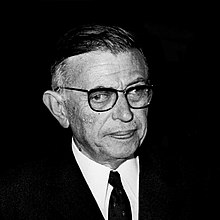Jean-Paul Satre
| Jean-Paul Sartre | |
|---|---|

Sartre in 1967
|
|
| Born |
Jean-Paul Charles Aymard Sartre 21 June 1905 Paris, France |
| Died | 15 April 1980 (aged 74) Paris, France |
| Alma mater | École Normale Supérieure, University of Paris (BA/MA) |
| Era | 20th-century philosophy |
| Region | Western philosophy |
| School |
Existentialism Phenomenology Hermeneutics Anarchism Western Marxism (early) |
|
Main interests
|
Metaphysics, epistemology, ethics, consciousness, self-consciousness, literature, political philosophy, ontology |
|
Notable ideas
|
Bad faith, "existence precedes essence", nothingness, "Hell is other people", situation, "every positional consciousness of an object is a non-positional consciousness of itself",Sartrean terminology |
|
Influenced
|
|
| Signature | |
 |
|
Jean-Paul Charles Aymard Sartre (/ˈsɑːrtrə/;French: [saʁtʁ]; 21 June 1905 – 15 April 1980) was a French philosopher, playwright, novelist, political activist, biographer, and literary critic. He was one of the key figures in the philosophy of existentialism and phenomenology, and one of the leading figures in 20th-century French philosophy and Marxism.
His work has also influenced sociology, critical theory, post-colonial theory, and literary studies, and continues to influence these disciplines.
Sartre was also noted for his open relationship with prominent feminist and fellow existentialist philosopher and writer Simone de Beauvoir. Together, Sartre and de Beauvoir challenged the cultural and social assumptions and expectations of their upbringings, which they considered bourgeois, in both lifestyle and thought. The conflict between oppressive, spiritually destructive conformity (mauvaise foi, literally, "bad faith") and an "authentic" way of "being" became the dominant theme of Sartre's early work, a theme embodied in his principal philosophical work Being and Nothingness (L'Être et le Néant, 1943). Sartre's introduction to his philosophy is his work Existentialism and Humanism (L'existentialisme est un humanisme, 1946), originally presented as a lecture.
...
Wikipedia
